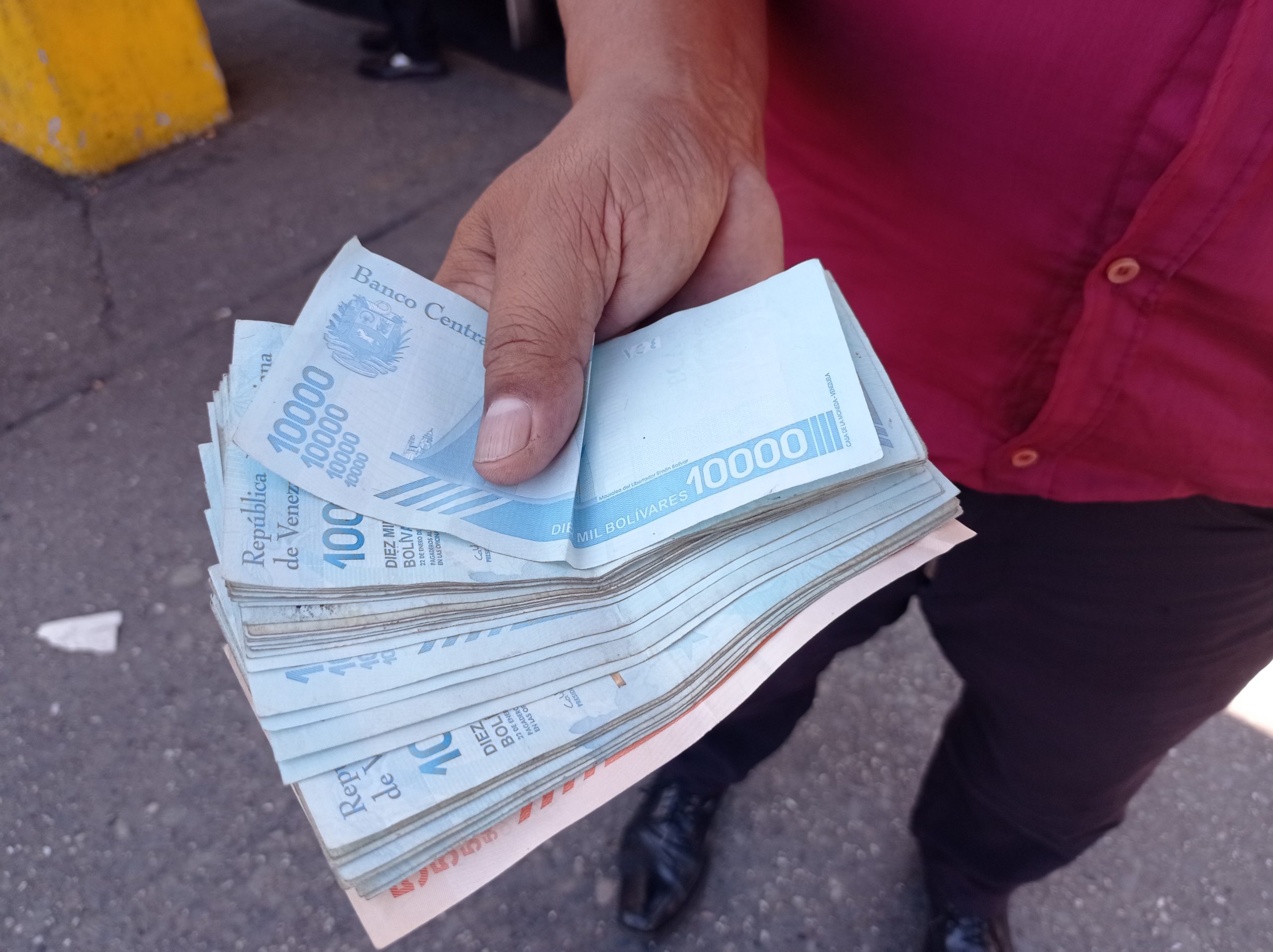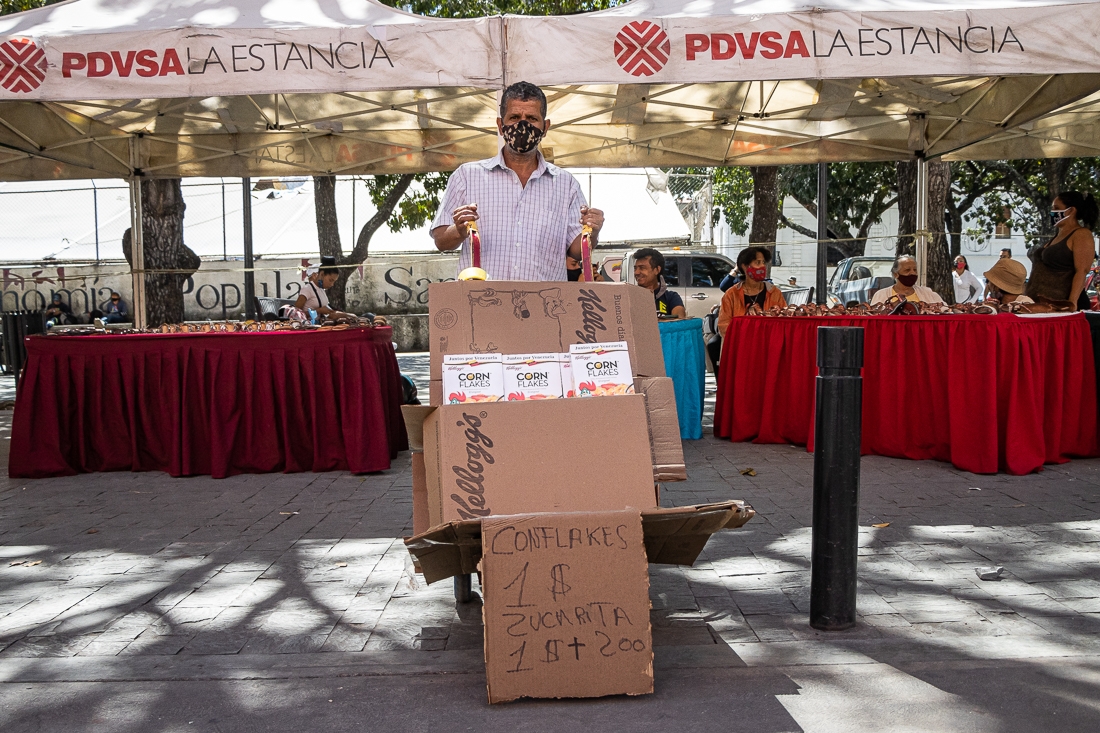No Change in Dollars: a New Challenge for Venezuelans
As the economy turned to an informal dollarization, there isn’t enough cash or a proper solution to protect the meager buying power of customers


Photo: Génesis Carrera Soto
“One dollar, one dollar!” Carlos Sifontes yells at the top of his lungs while he goes through San Jacinto, in downtown Caracas, hauling a cart with Corn Flakes and Frosted Flakes cereal boxes piled on top of each other.
A group of people come up to him and ask him “what’s your exchange rate?” to which Mr. Sifontes answers: “Thirteen hundred (bolivars per dollar), for now.” One of the girls offers him 100 bolivars below the price and he rejects the bid, saying that “one dollar is money, but with 1,200,000 bolivars you can’t even get a coffee.”
Mr. Sifontes’s reasoning sums up the current economic status of Venezuela: “Everything in this country is bought in dollars and that’s why everything is also sold in dollars. Nothing is stable here and we struggle hard to get one-dollar bills or lower denominations to buy and give change, bolivars in cash, and even the products, because without dollars you can’t buy anything… it’s a circle”.

Sovereign bolivars are only a necessary evil in their electronic form. On paper, they are a hassle.
Photo: Génesis Carrera Soto
This is how dollarization, which was deemed “unconstitutional” by Nicolás Maduro, became an “escape valve” for the economic crisis, as the chavista leader himself admitted in front of the media on December 9th.
And, while Maduro insists on saying that “we don’t have a dollarization of the economy because our official currency isn’t, and never will be, the dollar,” in every corner of the country you can pay in dollars; from a simple snack to fuel, food, and entertainment services. Henkel García, president of the economic firm Econométrica, says that there are between 2 billion and 4 billion dollars currently circulating in Venezuela, as opposed to the equivalent of 500 million dollars in bolivars in circulation in cash or electronic money.
This could be the reason why even street vendors like Sifontes handle payments in dollars and public transport has become an informal currency exchange office, where users pay their fare of 350,000 bolivars with a dollar bill and they get their change in bolivars so they have cash to buy some trivial things.
Alondra Cedeño lives in Valles del Tuy and travels to Caracas during flexible lockdown weeks to clean the house she works at. The way she gets cash is by paying with $5 or $10 bills to the fare collectors for the $1 trip from Santa Teresa to the capital, and they give her the rest in bolivars so she can keep her weekly routine.
“At times I’ve had to miss out on three buses because they don’t have change for the 10 dollars, that’s why when I don’t have lower denomination bills I leave home earlier, knowing that I’ll have to wait for a while before I can go, but that’s the only way I can work,” Cedeño adds.
Like most Venezuelans, she only uses bolivars to pay for bus fares, because the amounts of cash you can have are only enough to pay for these. Even though the current family of bills is made up of 11 bank notes: Bs. 50,000; 20,000; 10,000; 500; 200; 100; 50; 20; 10; 5; and 2, plus 1 and 0.5 coins, only the first two are in use across the country, the rest are no longer accepted as a payment method, and while they’re still in circulation, you can’t use them to buy anything.
Economist Asdrúbal Oliveros told AFP that over 65% of payments in cash in the country are made in U.S. dollars. This is the result of a lack of cash in bolivars, hyperinflation and the eighth consecutive year of recession.
The null value of the Venezuelan currency makes it infeasible for anyone to think about having bolivars and Venezuelans like Mr. Sifontes resent that. When this trader goes in to buy products, he can’t pay in bolivars, wholesalers request payments in dollars and in cash, and they don’t dispatch to anyone who doesn’t have the exact amount to pay, because they don’t have change for higher denomination dollar bills.
No change
The de facto dollarization happened despite the orders by the Executive and is countered by the lack of cash flow. While Maduro’s aim is to have a completely digital economy, commercial transactions are known for offering sales, having to take non-essential products home, or losing a few dollars to “round up” the purchase.
Marilyn Cabricio owns a candy stand outside the Parque del Este, in Caracas. She admits that most of her sales are paid through the point of sale, which she rents from another salesperson for a fee of 12% of the final purchases each day, but that hundreds of people come by to ask for change for 10, 20, and even 50 dollar bills, or even try to buy something for under 5 dollars and get change in foreign currency.

Merchants have to manage to bring the formats of their offer closer to the purchasing “power” of their customers
Photo: Génesis Carrera Soto
The trader explains that foreign currency purchases establish a mutual agreement between the buyer and the seller, since many don’t have the means to test if bills are fake or not, and those who want to buy something agree to take other products as change to round up the final sale.
Cabricio knocks down the fear some people might have about moving around the streets with dollars. She says she’d rather have three 20 dollar bills in her purse than having to hoist its equivalent in bolivars: 96 million in two thousand Bs. 50,000 bills.
“It’s better to have dollars, just imagine having that bundle of bolivars, there’s no way. You risk getting robbed because having cash right now is like having gold, but not because of its real worth but because of how deals are made to sell what little there is of it,” says the seller who manages to make between 10 and 20 dollars per week in sales.
Citizens have to face the lack of cash in bolivars, the lack of change for their dollars, and strict traders who don’t accept U.S. currency if it’s in poor shape. For the latter, public transport has become another needed exchange center.
Another path taken by businesses is offering sales and two for one deals. Roberto Petit has been a hotdog vendor in downtown Caracas for 15 years and he says that sales stop when there’s no change for dollar payments.
“Now I sell two hotdogs and a burger, plus a soda for $10 or three hotdogs and a soda for $5 and that type of thing… I used to think it wasn’t in my favor, but now it works out because I round up the prices,” Petit says.
This strategy is being implemented in many businesses in different areas, including hair salons, where they offer packages that can be paid with one bill in order to avoid giving change to customers. “The important thing is to not lose the money or the customer, because I’ve had to buy something urgent and they don’t have change, then I end up taking it anyway and practically giving the money away,” Solangel Valverde says, a hairdresser in a salon in La California.
A Spanish version of this article was first published in Cinco8
Caracas Chronicles is 100% reader-supported.
We’ve been able to hang on for 22 years in one of the craziest media landscapes in the world. We’ve seen different media outlets in Venezuela (and abroad) closing shop, something we’re looking to avoid at all costs. Your collaboration goes a long way in helping us weather the storm.
Donate




